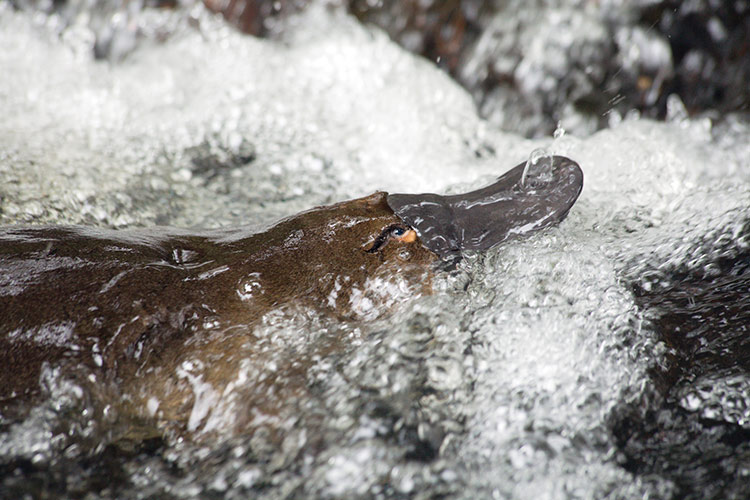Platypus

Photo: Michael Roberts
Hobart's rivulets are home to a wonderful range of aquatic wildlife. This includes native fish, the rakali – a native rat, and of course platypuses.
Hobart's rivulets are ecologically healthy and well protected within the forests of Wellington Park. However, they face multiple challenges as they enter Hobart's suburbs and the city. The main challenges are rubbish and pollution.
Discarded twine has led to the death of a platypus in the Hobart Rivulet.
Help keep our platypuses safe
- Pick up litter whether or not the litter is found near water. Particularly anything that could get caught around a platypus's bill, neck or body.
- Spread the word that plastic bracelets and elastic hair ties can be lethal for wildlife. Items dropped in the street or in playgrounds can be carried through storm water drains and into platypus habitat.
- If you see a platypus in distress please avoid trying to contain or handle the platypus. Males have venomous spurs on their hind legs that can cause excruciating pain. Keep pets away from the platypus, and try to maintain sight of the animal if possible. Call the Bonorong Rescue Service on 0447 264 625 (0447 ANIMAL) for further advice.
- Cut through ALL metal or plastic rings or loops of any size before disposing of them – just to be on the safe side.
- Avoid washing motor vehicles on impermeable surfaces such as driveways or carparks. Especially if the soapy water runs off to a concrete gutter or stormwater drain.
- Minimise your use of herbicides, pesticides and fertilisers on gardens.
- Avoid disposing of household chemicals by pouring them down a gutter, drain or toilet. For example example, lubricants, solvents, preservatives, cleansers, paints. Learn how to safely dispose of chemicals on our A-Z waste guide.
- If you see pollution in or entering Hobart's waterways please report it to the City of Hobart on 03 6238 2711. This includes not just paint, but sediment from building sites and concrete wash.
Join a Bushcare group
Get involved with the City of Hobart Bushcare program. The Hobart Rivulet Bushcare group is doing great work enhancing platypus habitat along the rivulet.
To find out how to get involved, visit our Bushcare page.
Become a citizen scientist
People across Australia are joining the citizen scientist movement. They are becoming active participants in monitoring and tracking the health of our native species.
You can help scientists discover more about the behaviour and locations of Hobart's platypus populations.
The Hobart Rivulet is probably one of the easiest and most reliable places in Australia to view platypuses. This is wonderful, but also means we as residents are responsible for looking after these precious and unique monotremes.